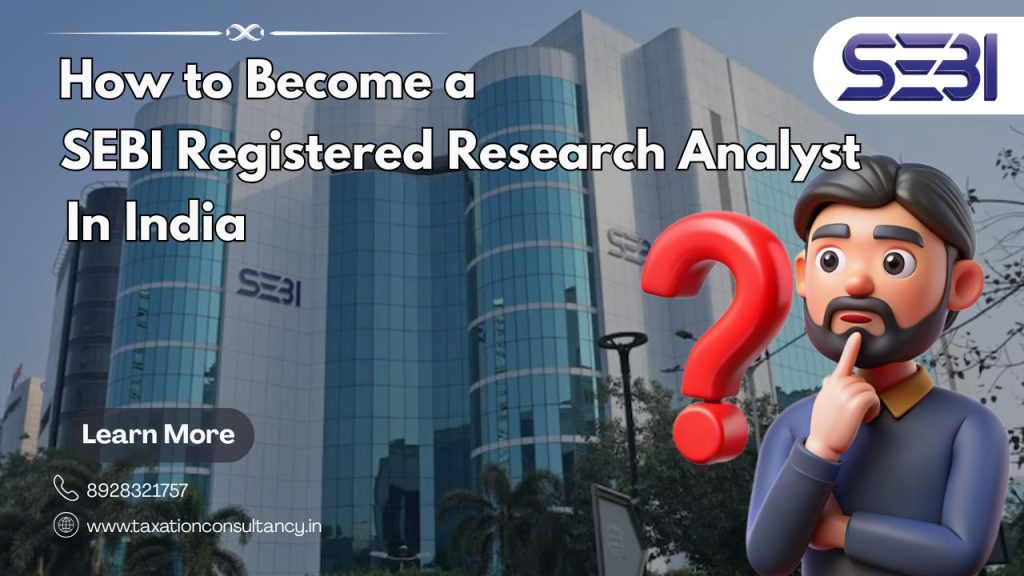How to Become SEBI Registered Research Analyst – Taxation Consultancy
Introduction
Have you ever wondered who those experts are that give market predictions or investment advice with confidence on TV or financial blogs? Most of them are SEBI Registered Research Analysts — professionals authorized to provide research-based investment advice in India. Becoming one not only boosts your credibility but also allows you to legally offer investment guidance under SEBI’s watchful eyes.
If you’re from a finance, taxation, or consultancy background, this path can be both fulfilling and lucrative. In this guide, we’ll walk through everything you need to know — from eligibility, qualifications, and the SEBI research analyst exam, to the registration process and documentation — in simple, human language.
Learn how to become SEBI registered research analyst. Understand SEBI research analyst regulations, eligibility, and SEBI registered research analyst exam.
What is a SEBI Registered Research Analyst?
A SEBI Registered Research Analyst Exam (RA) is a professional authorized by the Securities and Exchange Board of India (SEBI) to provide research-based investment advice. Their job is to analyze securities, prepare reports, and offer insights that help investors make informed financial decisions.
Think of them as the “navigators of the stock market”, guiding investors through the sea of market fluctuations using data and research rather than guesswork.
Why Become a SEBI Registered Research Analyst?
In India’s booming financial market, the demand for ethical and regulated investment advice has skyrocketed. By becoming SEBI registered, you gain:
- Legal authority to provide investment research and advice.
- Trust and credibility among clients.
- Career growth in finance, taxation, and consultancy.
- Business opportunities in financial advisory firms or as an independent analyst.
If you’re already in taxation consultancy, adding SEBI registration gives your practice a new edge — you can provide tax-efficient investment advice alongside compliance and reporting services.
Understanding SEBI Research Analyst Regulations
The SEBI (Research Analysts) Regulations, 2014 govern the conduct of research analysts in India. These rules ensure transparency, fairness, and protection for investors.
Key points include:
- Analysts must register with SEBI before offering research or advice.
- Analysts must disclose conflicts of interest and maintain research integrity.
- All research reports must follow SEBI’s disclosure standards.
- Non-compliance can lead to penalties or suspension.
Essentially, SEBI ensures that analysts act as responsible professionals, not market manipulators.
Eligibility Criteria for SEBI Research Analyst
Before applying, ensure you meet SEBI’s eligibility requirements:
- Age: Minimum 18 years.
- Education: Graduate or postgraduate in finance, commerce, economics, or related fields.
- Experience: At least five years of work experience if you don’t hold a specialized degree.
- Certification: Must hold a valid NISM Research Analyst Certification.
- Fit & Proper Criteria: SEBI checks your background, financial integrity, and absence of any criminal record.
Educational Qualifications Required
SEBI accepts the following qualifications:
- Graduate degree in Commerce, Finance, Economics, or Business Management.
- Professional qualifications like CA (Chartered Accountant), CFA (Chartered Financial Analyst), or CS (Company Secretary).
- For those from Taxation Consultancy, your finance background already gives you a strong foundation — you just need to add NISM certification.
Certification and SEBI Research Analyst Exam
To become a registered analyst, you must pass the NISM-Series-XV: Research Analyst Certification Examination.
About the Exam:
- Conducted by: National Institute of Securities Markets (NISM)
- Format: 100 multiple-choice questions
- Duration: 2 hours
- Passing Marks: 60%
- Validity: 3 years
Syllabus Overview:
- Basics of Indian Securities Market
- Types of Research
- Fundamentals and Technical Analysis
- Company Valuation
- Regulations and Ethics
It’s not as tough as it sounds — with proper preparation, you can clear it within a few weeks.
Step-by-Step Process to Register with SEBI
Here’s a simple breakdown of how to become SEBI registered:
Step 1: Pass the NISM Research Analyst Exam
Get your certificate from NISM to prove your competence.
Step 2: Prepare the Required Documents
These include your educational certificates, experience letters, PAN, Aadhaar, and net worth proof.
Step 3: Apply via SEBI Intermediary Portal
Visit https://siportal.sebi.gov.in/ and fill out Form A under “Research Analyst.”
Step 4: Pay the Application Fee
- Individual: ₹5,000
- Non-individual (firm/company): ₹15,000
Step 5: Submit Hard Copies to SEBI Regional Office
You’ll need to courier physical copies to SEBI after online submission.
Step 6: SEBI Review and Approval
SEBI will verify your documents, background, and eligibility before granting registration.
Documents Required for SEBI Registration
Be sure to have the following documents ready:
- NISM Research Analyst Certificate
- Educational qualification proofs
- Identity and address proofs (PAN, Aadhaar)
- Income tax returns for the last 3 years
- Net worth certificate from a CA
- Business plan (for firms)
- Declaration of “fit and proper” status
Having these organized will make your registration smooth and hassle-free.
Fee Structure and Renewal Process
The registration is valid for five years, after which you must renew it.
- Registration Fee: ₹5,000 (individuals) or ₹15,000 (firms)
- Renewal Fee: Same as above, payable every five years
- Annual Compliance: Submission of activity reports and financials to SEBI
Failure to renew on time may lead to suspension or cancellation.
Role of a Research Analyst in Taxation Consultancy
For taxation professionals, SEBI registration opens up an exciting synergy. Imagine being able to guide your clients not only on tax savings but also on investment growth.
You can:
- Advise on tax-efficient investment strategies.
- Provide research-backed recommendations on securities.
- Help clients balance tax planning and wealth creation.
It’s like being both the architect and builder of a client’s financial house — ensuring it’s both strong (compliant) and beautiful (profitable).
Common Mistakes to Avoid During Registration
Many applicants face delays or rejections due to avoidable errors. Watch out for these:
- Submitting incomplete documentation.
- Providing invalid or expired certificates.
- Failing to meet educational or experience criteria.
- Not disclosing prior disciplinary actions.
Double-check your application before submission — it’s better to be safe than sorry.
Benefits of Becoming SEBI Registered
Becoming SEBI registered brings immense professional and business value:
- Legal recognition and protection under SEBI laws.
- Increased client trust and higher credibility.
- Access to financial markets and data platforms.
- Business expansion opportunities in advisory and consultancy.
You can even collaborate with brokerage houses, fintech platforms, or investment firms.
Career Opportunities and Salary Potential
Once registered, you can work as:
- Independent Research Analyst
- Investment Advisor
- Equity Research Associate
- Taxation & Financial Consultant
Salary Range:
- Entry-level: ₹4–6 LPA
- Mid-level: ₹8–12 LPA
- Senior level / Independent consultants: ₹15 LPA+
Your income potential often depends on experience, client base, and reputation.
Maintaining Compliance and Ethics
After registration, analysts must maintain ethical standards such as:
- Avoiding conflicts of interest.
- Maintaining data confidentiality.
- Disclosing financial interests in research reports.
- Following SEBI’s Code of Conduct.
Think of it as staying “financially fit” — regular compliance keeps your license and reputation healthy.
Conclusion
Becoming a SEBI Registered Research Analyst is a rewarding journey that blends financial knowledge, analytical skill, and ethical practice. For taxation consultants, it’s the perfect add-on — expanding your expertise into wealth advisory and investment research.
With dedication, the right qualifications, and adherence to SEBI research analyst regulations, you can build a credible and profitable career in India’s evolving financial ecosystem.
FAQs
1. What is the validity period of SEBI Research Analyst registration?
The registration is valid for five years, after which it must be renewed with SEBI.
2. Can a taxation consultant become a SEBI Registered Research Analyst Exam?
Yes! If you have the necessary qualifications and clear the NISM Research Analyst Exam, you’re eligible to apply.
3. What happens if I don’t renew my registration on time?
Failure to renew before expiry may lead to suspension or cancellation of your SEBI registration.
4. How long does SEBI take to process the registration?
Typically, SEBI takes 30–60 days to verify and approve applications, depending on document accuracy.









